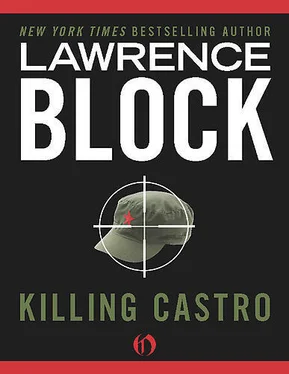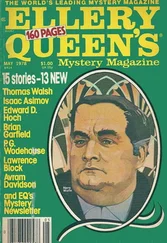And the tension grew. Castro was due within the week. They were in position now, a position they presumably could hold when the time came. Their camp was in the hills, but they were near a rock formation that overlooked the road. From these rocks an ambush would not be difficult at all. Manuel had explained it to Fenton but actually little explanation was necessary.
There were ridges of rock on either side of the road. The road had been cut through and the rock remained around it. Shrubs grew from cracks between boulders to provide additional cover. When the time came, the rebels would station themselves, half on either side of the road. There were ten of them now—Manuel, Maria, Garth, Fenton, Taco Sardo, Francisco Seis and four new recruits whose names Fenton did not know yet. They would wait for the motor convoy with Castro at its head. Then, as a triumphant Castro sped to Santiago, they would open fire and kill him.
“We may have much luck,” Manuel said. “Fidel’s brother, Raul, he may be with him. In the car. We may get both birds. Is that how it is said?”
“You mean two birds with one stone.”
“That is what I mean. It would be good, killing them both. It would be very good.”
Fenton said nothing. He was geared for killing, geared and primed to kill Fidel Castro. It did not occur to him that it would be good or bad to add Fidel’s brother to the list of casualties. That did not seem to enter into it.
“Fidel and Raul,” Manuel was saying. “I will have much name, amigo . I will be the man who executed both the Castros. That will put me very high in the eyes of the people. Is it not so?”
“Of course,” Fenton said.
“And I shall have followers. My name will be a unifying force, a force tying Cubans together to rally against the Castro butchers. They may shout my name, amigo .”
Fenton nodded uncertainly.
“When Castro is dead,” Manuel began. “What will you do then?”
“I don’t know,” Fenton said honestly. Somehow, he had not given the question any thought. His whole being was geared now to one thing only, the destruction of Castro. What happened after that did not matter. After Castro was dead, Fenton would wait for cancer to kill him. It hardly seemed to matter where he waited, or what he did while he waited. He would be waiting for death.
“You could stay in Cuba.”
“Why?”
“With us,” Manuel said. “There will be much fighting, of course. A revolution, a full revolution. You have fought with me already, and you could continue to fight with me.”
“With you?”
“Of course,” Manuel said. He took a knife from his jacket pocket, opened the blade, idly sliced a slender branch from a tree. He began trimming the twigs from the branch.
“I used to make fishing poles in this manner,” Manuel said. “When I was a boy.”
Fenton kept his mouth shut.
“Here in Cuba,” Manuel went on, “there would be a place for you. A better place than in the United States.”
“What sort of place?”
Manuel shrugged. Now he was using the knife to peel bark from the branch. He was very deft with the knife. He removed the bark to expose the clean, white wood beneath.
“The other day,” Manuel began, “Maria told me what took place.”
“You mean with Garth?”
Manuel nodded.
“He knocked me out. I was lucky to come to in time to be much good.”
“You were very good,” Manuel said. “When I first met you, I thought you were less of a man than you are. I mean that I did not know you would be good at the fighting. I thought you were a quiet man, you know?”
“I am a quiet man.”
“You have much heart. I did not know that then. I know it now. Because of what happened with Maria, because of the fighting we have been in together. You have much heart, amigo .”
Fenton did not know what to say. He was pleased. He felt… alive, useful. He was very pleased.
“Later,” Manuel went on. “You will stay with us, yes?”
“If you want me to stay.” Why not, he thought. There was no place to go, nothing to do but wait for death. He might as well wait in Cuba. He could die fighting, could die at Manuel’s side. Manuel was his friend, his comrade in arms. Better to die at his side than in the teller’s cage at the Metropolitan Bank of Lynbrook.
“I want you to stay.”
“Then I will stay, Manuel.”
Now Manuel was cutting the branch into small sections, then idly tossing the sections into the brush. “There will be good things for you,” he went on, his voice quiet but intense. “When Castro dies, the revolution will begin. And the revolution will take little time. The Castristas will flee the island just as the Batistianos fled before them. And then, amigo , Cuba will be ours.”
Fenton said nothing. Something was bothering him, gnawing at him. He was unsure what it was.
“Someone will have to lead the nation,” Manuel went on. “Someone will have to be the strong man, the ruler.”
“Who do you mean?”
Manuel did not answer directly. “A man with reputation,” he said easily. “A man the people know. A man, for example, with the scalps of Fidel and Raul at his belt.”
“You mean yourself?”
Manuel shrugged. “Someone must take the job. And it would be good to have a man as an assistant. An American, so that the United States will know that Cuba is with the Americans and not the Communists. A man like yourself, for example.”
They left it there. But later Fenton thought of the conversation and something like sickness spread through his body. This was the revolution, this was the rising of the people—with Manuel already hungry for power, long before Castro was dead. This was the revolution.
Well, to hell with it. He had his job to do and that was all that concerned him. Castro was a dictator and he would die. The revolution would go on and he, Fenton, would join it.
In time, Manuel, or someone like him, would be the dictator—probably as despotic a one as Castro, perhaps worse. But that was no concern of Fenton’s.
He would be dead before it happened.
It was a short while past midnight on the first of January, 1959. Fulgencio Batista loaded a limousine with his luggage. His second wife and three of his children were with him, ready to leave the presidential estate at Kuquine. Batista said farewell to his servants, told them that the family was off on a brief trip. Then, with his limousine flanked by secret service cars carrying troops with submachine guns, the dictator headed for Camp Columbia.
Within two hours, Batista’s plane was in the air, headed for sanctuary in the Dominican Republic. Like a thief in the night, the strong man of Cuba had stolen out of his own country. His time for power was over and he could now do nothing more than save his own life.
The revolution was an unqualified success. The following day Castro and his bearded followers rode in triumph through the streets of every principal city of the islands. Crowds thronged after them, screaming Castro’s name at the tops of their lungs. The Twenty-sixth of July Movement, a movement pledged to the hilt to freedom and liberty, had triumphed.
The victory of Castro was the defeat of Castro. The shouts of acclaim for the revolution were that revolution’s death-knell. Because men who win wars are poor at making peace, and men who win fame as rebels are all too often unequal to the task of governing the land they have liberated. The switch from traitor to hero is too sudden, the new role too difficult to play properly.
There have been exceptions—George Washington in America, for one. But the exceptions are few and far between. It is all too simple for the men who overthrow dictators to step nimbly into the dictator’s shoes, all too easy for the liberator to place his own chains upon his nation.
Читать дальше












